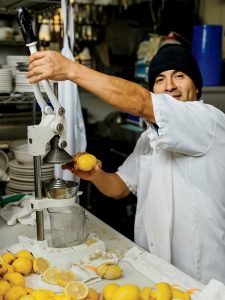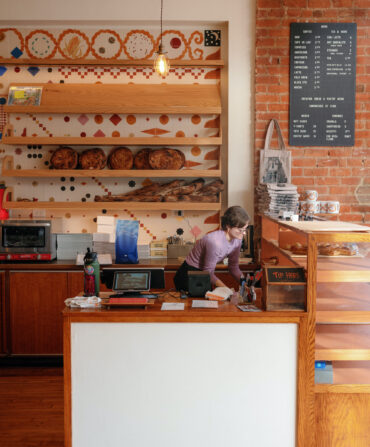Food & Drink
Kitchen Diplomacy
For Bill Smith, the chef who has quietly kept Chapel Hill, North Carolina’s beloved Crook’s Corner at the heart of the Southern culinary universe for more than twenty years, food always revolves around family—the one he’s related to and the one he isn’t
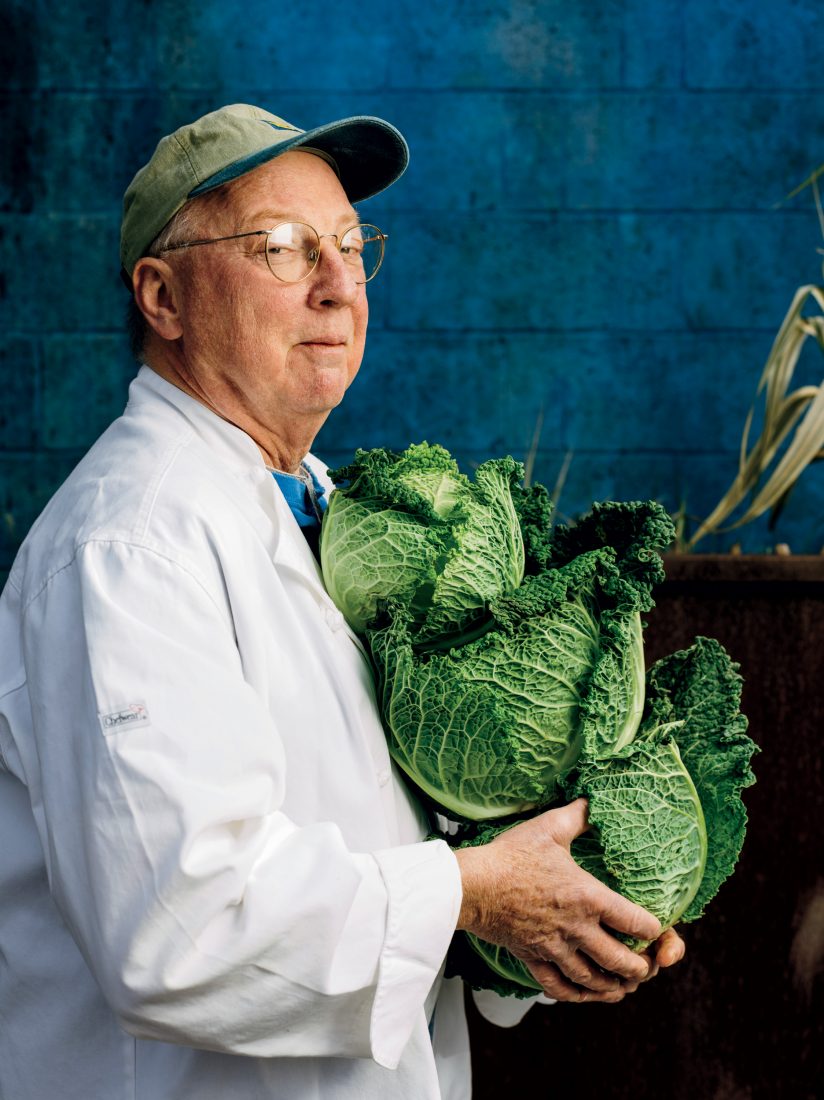
Photo: Andrew Kornylak
Bill Smith is a big deal. This is something he would never, ever tell you. And you probably wouldn’t guess it either, not from just looking at him. Today, for example, he’s wearing a T-shirt with the word LARD on it, a baseball cap, very worn jeans, and incongruously shiny loafers. He just got off his bicycle, which, incidentally, is his only means of transport, and the radio in his restaurant kitchen—loud—is tuned to La Ley 101.1, the local Mexican station.
“This is the whole show,” he says, gesturing around him.
On the counter is a plastic container labeled HAM JUICE. It holds the drippings from a ham cooked in Coke. A small mountain of bacon sizzles in a skillet the size of a stop sign. Sebastian Lopez-Leon, a cook from Mexico in his thirties, slices tomatoes at the prep station with a sly grin on his face that seems poised to burst into laughter.
It all feels more like the diner where your college buddies used to work than it does “sacred ground for Southern foodies,” which is what the New York Times has called it. But don’t be fooled. This is sacred ground. This is Crook’s Corner—Chapel Hill, North Carolina’s revered corner of cuisine—one of the birthplaces of the modern renaissance in Southern cooking. Smith’s humble demeanor belies the fact that he’s the one who’s kept this kitchen at the center of that movement for the past twenty-one years, a feat he’s achieved by serving food that’s at once sophisticated and simple, elegant and playful, and so down-home good that I, for one, have at times been known to dream about it.
With Smith at the helm, Crook’s Corner has been named a James Beard America’s Classic Restaurant. Twice he’s been a finalist for the organization’s prestigious Best Chef: Southeast award. He’s written a lauded cookbook, Seasoned in the South, and he has a new one, Crabs & Oysters, due out later this year. If you ask him when he started thinking of himself as a chef, though, he says, “I don’t know if I do, even now. I never set out to be a chef. It never crossed my mind.”

Photo: Andrew Kornylak
Well-thumbed cookbooks line a shelf.
Originally from historic New Bern, North Carolina, Smith, who is sixty-six, moved to Chapel Hill to go to college but was soon headed to New York City with the Red Clay Ramblers as a dancer in the successful 1975 off-Broadway run of the show Diamond Studs. When he returned, he got a job clearing tables at La Résidence, a local French restaurant owned and operated by Bill Neal and his wife, Moreton. The atmosphere seemed to suit Smith.
“I liked the idea of making dinner an event,” Smith says, and he was excited by the effort “to make good food and gather people around you.” After all, he says, “it was like what I was used to growing up. My great-grandmother entertained the family every day.”
Nothing inspires Smith’s cooking more than family. In New Bern he was surrounded by a large extended family of cooks. It was his great-grandmother, though, who ruled the roost. Look on the menu at Crook’s Corner on any given night, and odds are you’ll find at least one of her dishes there—maybe the crab stew or her corned ham, a recipe Smith recently shared with fellow North Carolina chef Vivian Howard on the Christmas episode of her PBS series A Chef’s Life. Other classic Smith dishes, such as Aunt Hi’s oyster stew, steak with bourbon sauce, and honeysuckle sorbet (which started from blossoms he picked while riding his bike), speak to both his home state and the large family roots that have grown here.
“It informs everything we do,” Smith says. “The longer we’ve been here, the more I’ve gone back to North Carolina as a source.”
But North Carolina is a complicated source. Smith, who is gay and came out in his twenties, was raised in a small conservative town that, in a classic Bill Smith understatement, he describes as “being very unlike Chapel Hill,” long one of the more progressive zip codes in the state. And while the city isn’t as much of an outlier as it once was, North Carolina as a whole still struggles with acceptance. The state’s recent passage of Amendment One, banning same-sex marriage (since struck down in federal court), is a prime indicator to many, Smith included, that equality is not yet at hand. Even if he’s quiet about it, which he usually is, Smith has long campaigned for a variety of human rights causes. This past June he participated in the Big Gay Mississippi Welcome Table, an event held in New York City to protest Mississippi’s Religious Freedom Restoration Act, which many fear will facilitate discrimination against gays and lesbians.
Another issue close to Smith’s heart these days is the integration of the South’s growing immigrant community. North Carolina doesn’t look like it did when Smith was a child. The region has long felt the increasing influence of Hispanic culture, and today, the Latino population in North Carolina stands at 9 percent—a number that surely rises if you peek into the kitchens of its restaurants. Crook’s Corner is no exception. Most of Smith’s excellent cooks hail originally from Mexico.
It takes only a few minutes in the kitchen to see that these staff members are not only the faces of the new North Carolina—they’re also the newest additions to Smith’s family. He speaks and jokes with them in playful Spanish. They spend time with one another outside of work. Smith has loaned Lopez-Leon money to help with his child’s schooling. He visits Mexico with his staff at least once a year, if not more. He’s sponsored two of his cooks’ families for citizenship. And just like his large New Bern family, these new brothers and sisters exert a profound influence on his cooking.
It’s an openness that Smith is well known for.
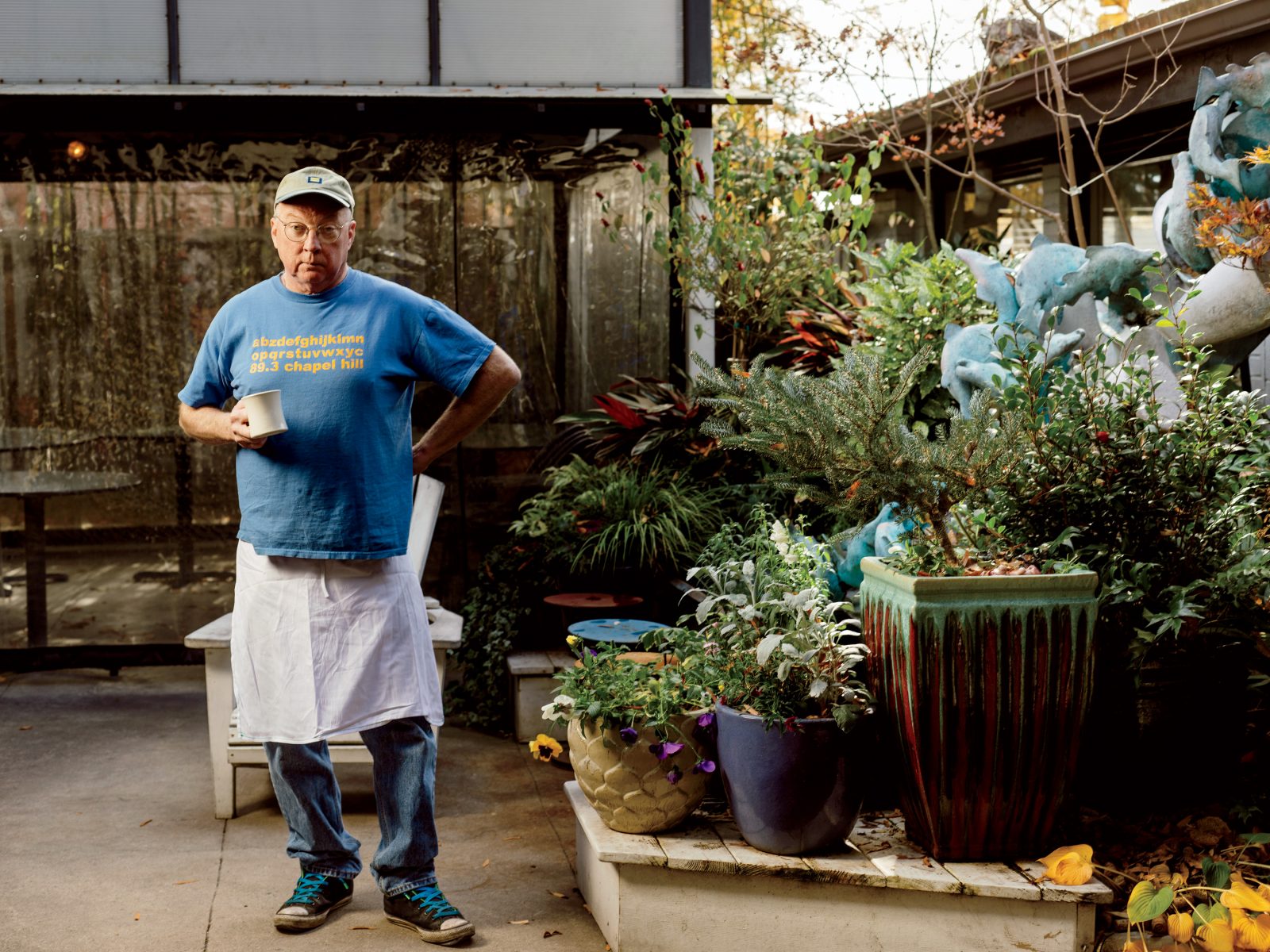
Photo: Andrew Kornylak
All in the Family
Smith in the Crook's courtyard.
“Bill’s dishes aren’t just an expression of North Carolina ingredients, but also the people he loves,” says Andrea Reusing, the celebrated chef-owner at Lantern, another one of Chapel Hill’s best restaurants. Frank Stitt, the award-winning chef at Highlands Bar and Grill in Birmingham, Alabama, says, “He’s a leader in recognizing the incredible contribution that our Latin community makes to our businesses and to our culture.”
Today Smith is making tamales from a recipe given to him by the wife of one of his kitchen staff. These savory dough packets recently brought down the house at the annual Southern Foodways Symposium in Oxford, Mississippi, where Smith cooked a Nuevo North Carolina Supper—just a little family dinner for four hundred, with dishes all inspired by his Latino coworkers. He opens a small plastic bag filled with different peppers—jalapeño, habanero, and tiny ones called chile pequin—given to him by one of his cook’s uncles. A deliveryman drops off some produce, and within a minute he’s pulled out a necklace and is comparing it with the one Smith is wearing. They’re both scapulars—Catholic tokens often given by women in Mexico to men in the family. Smith received this one from Lopez-Leon’s wife.
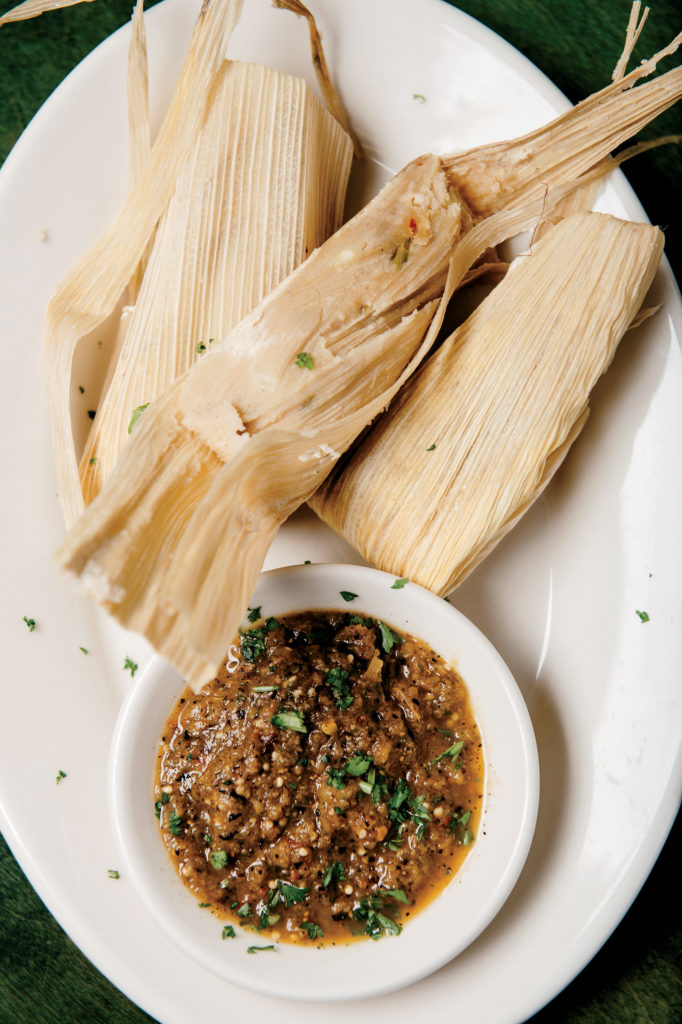
Photo: Andrew Kornylak
Food Without Borders
Tamales made with fresh corn, chiles, and country ham drippings.
Lopez-Leon stops slicing tomatoes and comes over, wrapping both arms around Smith. “He’s like my padrino,” he says.
“I am not!” Smith says. “Padrino—that means godfather. I am not your godfather.” Smith shakes him off, then says, “I am the godfather of several of their children, though…” He pulls out his phone. “These are my grandchildren,” he says, displaying a photo of four kids in Halloween costumes. They’re the children of another one of his crew, Ricardo De La Torre. Originally from Mexico City, he has cooked with Smith for more than twenty years. Smith points to each child, saying each name with pride, just like a grandfather.
“He’s a good friend,” De La Torre says quietly, and then, after a moment of silence, looks directly at me, as if he wants to make sure I understand. “Everything I know, he’s teaching me.”
Smith is usually keen to point out just the opposite, relishing all that he learns from De La Torre and the rest of his staff. He defers credit for developing new dishes himself, calling his process in the kitchen a collaboration. He recounts a recent discussion he had with one cook who suggested a better way to make a piecrust. “And of course,” Smith says, “he was right.” He tells long stories about the time he’s spent with his coworkers in Mexico, including one involving a seven-hour ride in a makeshift cab through a lawless region on the way to a wedding in Oaxaca. “I go down there all the time,” Smith says. But as for what he does when he’s down there, it’s less culinary exploration than it is plain family time. “I sit on the hood of a car and drink beer and hold babies.”
Crook’s Corner is in fact on a corner, housed in a humble building that was, at various times in the past, a fish market, a taxi stand, and a tackle shop. The building itself is probably the last thing you notice when you arrive, though. What catches your eye first is the improbable Wonderland garden that surrounds the place, the sculpture of a pig atop a pole rising from the roof, the hubcaps that decorate the fence out front, and the selection of “critters”—animals sculpted from logs—that stand guard. The former owner of the property, Rachel Crook—for whom the corner is named—was last seen alive here in 1951 before being found murdered. The crime has never been solved.
“I don’t know if this place is haunted,” Smith says, “but it ought to be.”
If Crook’s Corner is haunted by anything, it’s the benevolent ghost of Bill Neal, the original head chef. Along with Gene Hamer—who still owns the restaurant—Neal bought the place in 1982 and began its transformation from barbecue shack to culinary temple. Neal died in 1991 at forty-one, a young victim of AIDS, but not before making a profound impact on the national consciousness about Southern food. He was one of the first chefs to renew the South’s pride in its culinary history and give it a modern, national platform. Crook’s Corner’s most iconic menu item, its shrimp and grits, is a classic Neal dish and still the restaurant’s biggest seller.
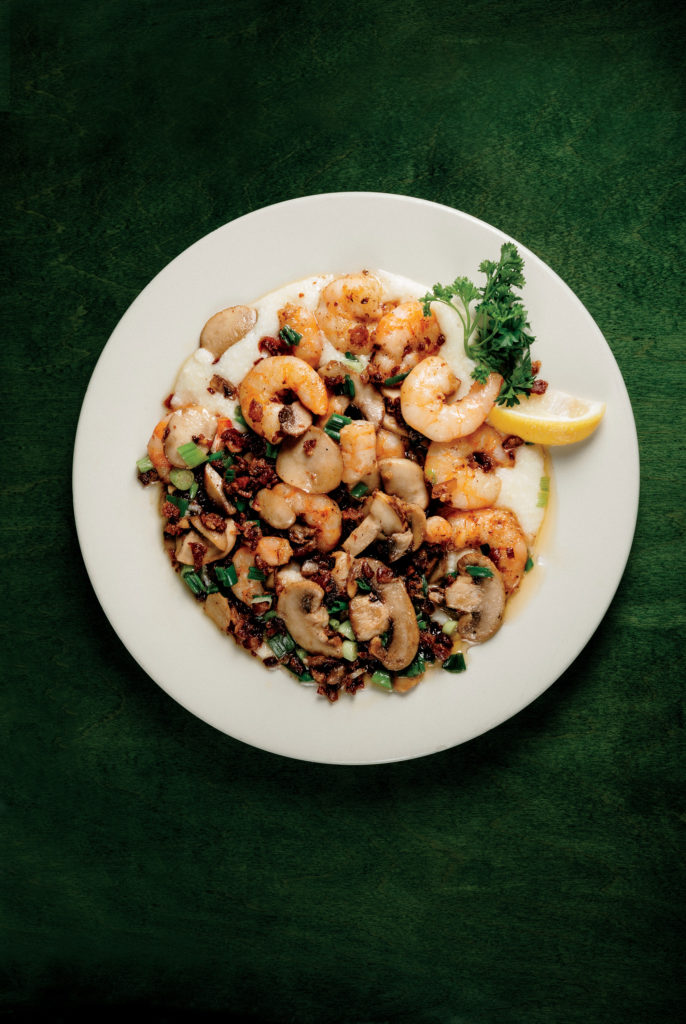
Photo: Andrew Kornylak
Crook’s Corner’s iconic shrimp and grits.
Smith knew Neal well, and it’s hard not to notice the parallels. Smith got his start with him, and worked with him for years at La Résidence, where he took over head chef duties for Neal before eventually doing so again at Crook’s Corner. And much like Neal, a pioneer in the evolution of Southern food, Smith is now forging a new form of Southern cooking, combining his own personal history and the region’s contemporary Latino influence. But as is fitting with Smith’s laid-back personality, he seems to wear the mantle of his forebearer lightly. “I just trundle along,” Smith says, describing his career path. “I don’t think ahead very much.”
When I arrive for dinner one Friday night, I pull into the small gravel lot behind the restaurant. The first person I see is Smith, ducking into an outdoor storage shed at the edge of the lot.
“I’m getting linen!” he shouts.
It’s no surprise to see Smith always working, no matter the task. He’s busier than an overbooked politician, constantly adding items to an already hectic schedule. His mornings start at 8:30 a.m., when he rides his bike to work. He doesn’t even own a car. “I can’t say why,” he says. “I’m just weird. I’m sort of a Luddite. I don’t have a car or a television, but I have like five computers.” At work, as if he didn’t have enough to do already, he spends at least some time almost every day preparing food for donation. He doesn’t get home until 11:00 p.m., at the earliest, and somehow still finds time to write books and articles and make public appearances. None of it seems to faze him. “I’ve always been a night person,” he says in his usual easygoing style. “And a morning person.”
Inside, Smith joins me at the bar for a moment and orders a PBR. A seemingly endless stream of friends stop to say hello, as if the whole restaurant were on some cosmic lazy Susan that revolves around Smith at its center. On any given night, he’ll know half the people in the room, if not more. A plate of his classic fried oysters arrives, then the tamales, with a smoky salsa ranchera that Smith makes by “throwing vegetables on the grill and just scorching them.”

Photo: Andrew Kornylak
Smith’s Orange Red-Hot sorbet.
There’s almost always a sense of fun in Smith’s cooking, like his sublime homemade Orange Red-Hot sorbet, a dish he invented using leftover Valentine’s candy. “It reminds me of the popsicles I buy in Mexico that have gum inside them,” he says. His so-called Cheese Pork! is a schnitzel-type cut that employs shredded Swiss cheese instead of bread crumbs to coat the meat. For dessert, we have his Atlantic Beach Lemon-Lime pie. The pie, “like a lemon meringue without the meringue,” was inspired by the fact that when Smith was growing up, he was always told you could never have dessert after seafood unless it included lemon. Made with a saltine crust and infused with Smith’s past, his version of the North Carolina coastal classic is both simple and timeless. And very, very good.
Early the next morning, the Mexican radio station is back on, loud, and Smith is making a “quick false jambalaya” for a local charity, thrown together from assorted leftovers. Lopez-Leon cracks jokes about his broken phone, carrying on with Smith about who knows what. They speak such a personal Spanglish it’s like one of those languages you hear of that twins develop and no one else can understand.
“I probably would have already retired if I didn’t have these clowns around me all the time,” Smith says, stepping outside to catch some air. “Otherwise…it’d be like a coal mine.”
Huge, outlandish plants rise from oversize planters around him. The pig sculpture flies overhead. Mexican music pours through the screen door, carrying with it the scent of jambalaya and tamales. Smith leans on a fence. This world of his—a tasty muddle of family, Southern history, love, and food—is absolutely nothing like a coal mine.


